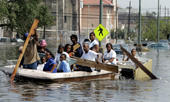 As a preparedness-products seller, I am seeing the same thing other merchants in similar markets are going through today. There is clearly a giant spike in preparedness-product sales across the United States since Hurricane Katrina. Reasons for that should be obvious.
As a preparedness-products seller, I am seeing the same thing other merchants in similar markets are going through today. There is clearly a giant spike in preparedness-product sales across the United States since Hurricane Katrina. Reasons for that should be obvious.Yet apparently, recognition of this wave of activity is somehow slow to dawn upon most in the media. Strangely, major media outlets are picking up bits and pieces of the phenomenon and reporting on it and interpreting it according to whatever agenda their editorial round table might be setting at this time. But I have yet to see an accurate report on the big picture and the implications.
Example ... This article published September 8 in the Chicago Tribune dangled under the splashy headline: "Fearful Southerners Buy Firearms at Torrid Pace." The story as written talked about fears, racist feelings and overtones, crime in the hurricane-devastated areas, and more. Of course, as much as what WAS said, was probably close to the mark. But the point missed is, the whole country is seeing a similar run on guns today.
More importantly, the larger story is not only about gun sales. I'm not involved in selling guns or ammo, but I can speak more intimately about the basic preparedness products I do sell, which are experiencing similar "torrid" runs. In fact, my overall business is bubbling along at a rate triple what it was a couple of weeks ago. And tellingly, my business is not coming from the areas where people are trying to recover; it is originating everywhere else across the nation, to include Alaska and Hawaii.
My primary source of preparedness food, Mountain House, is out of food and they are now placing all orders on backorder--reportedly for several weeks. In an email to me, my sales rep called their experience a national ordering frenzy. I understand virtually all other emergency food sources are also quickly depleting their stocks if they haven't already.
Other products that are sizzling--water filters and purification chemicals, and hand-crank/solar-powered radios and flashlights. Moreover, anything else remotely preparedness-related is selling fast too.
So?
The salient point is, a whole new segment of the population has suddenly been roused to realize that crisis readiness is not something anyone should overlook. It's common sense that could quite possibly make a life and death difference to anyone anywhere at any given time. Sometimes we get fair warning, sometimes we don't, but either way, being prepositioned to deal with crisis saves lives.
The 9/11 Lesson
On this fourth anniversary of 9/11, we recall the tragic wake-up call the nation received when a handful of determined, suicidal terrorists changed, among other things, our feelings of being insulated from danger here in America.
The period following that historic event saw a similar surge across preparedness markets as people did what they could to try to exert some control over their household's future security. Gun sales reached unprecedented levels and other basic and more advanced readiness-related markets also set records.
The lesson absorbed in 2001 was that we as a nation and people are in the crosshairs of some seriously misguided folks around the world. We could not any longer assume, if we ever did, that the government would be able to keep us fully secure from those day-to-day risks. Indeed, we still hear almost daily that even worse attacks on our way of life are not "ifs" but are inevitable.
The Katrina Lesson
Similarly, Hurricane Katrina has brought home another realization for a whole new slice of the population. I suspect that it is approximately as large a demographic segment as the 9/11 population impact was. That is, with Katrina's aftermath, we are either reminded or shockingly awakened to the fact that the authorities cannot be counted on to immediately save our lives in disaster scenarios. Responsible parties must assume that they are on their own in the event of catastrophe.
I don't see how anyone could come to any other conclusion if they are at all cognizant of what has been an ongoing, largely inefficient rescue operation across 90,000 square miles. Obviously, unknown numbers of people have died waiting for help.
The Trend Toward Popular Acceptance of Preparedness
This is a trend that will continue to build with time. No longer do the news media or Hollywood dare to cast as fools those who wisely seek to mitigate their risks. Indeed, one can recognize the change in tone in news reports of how being ready is the logical and prudent path.
Lo and behold, we are seeing the media now sending messages to the public (such as in this 9/10 NY Times article) that everyone should have at least two weeks worth of water, food, and supplies put aside, as opposed to the three-days worth that was previously the publicly accepted, government-recommended standard.
So what exactly are the implications of this next wave toward American household preparedness? One could extend many conclusions beyond the obvious, but suffice it to say, as a people, Americans are not as helpless and clueless as we have been portrayed. We are taking our lessons to heart and becoming stronger and wiser everyday.

No comments:
Post a Comment